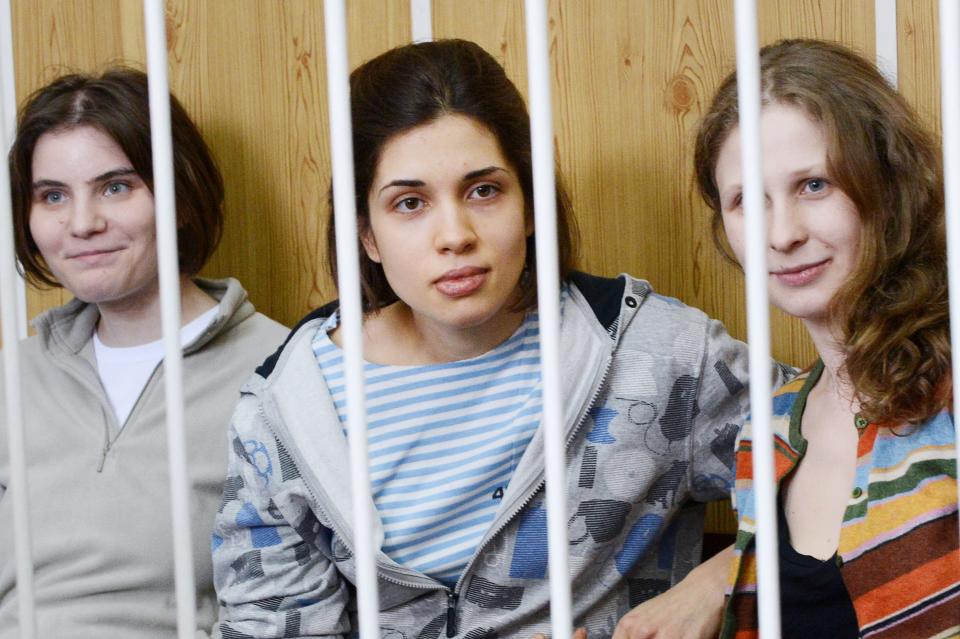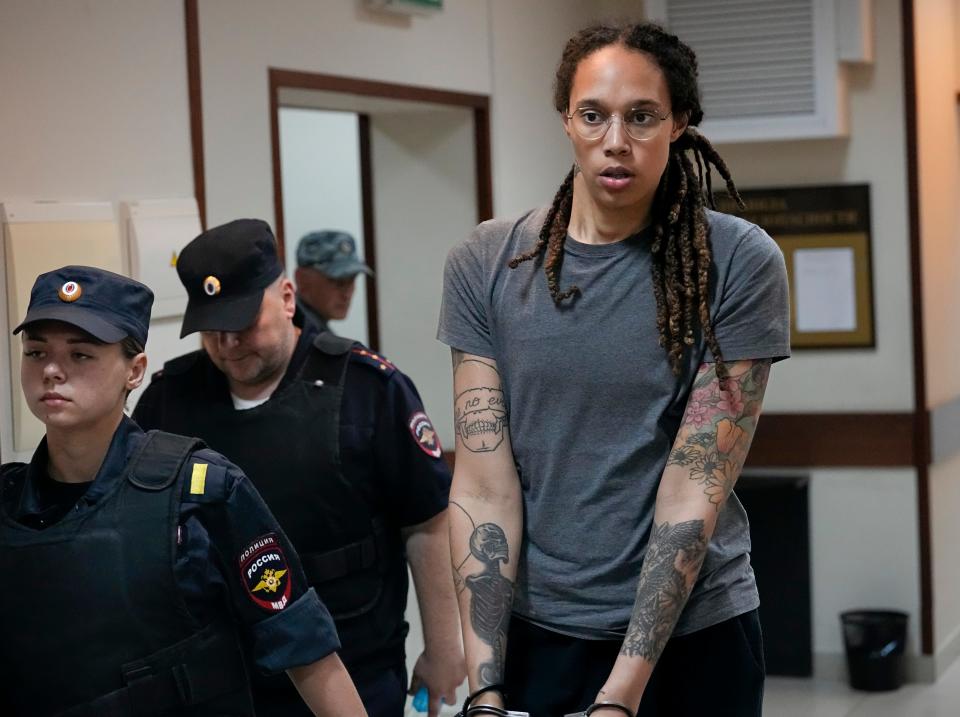Here's what life in a Russian penal colony could have been like for Brittney Griner
There’s been celebration since the release of American basketball star Brittney Griner from a Russian penal colony on Dec. 8, an unexpected burst of good news for many following a 10-month ordeal that drew global attention.
A 32-year-old, two-time Olympian, Griner was originally detained at the Moscow airport in mid-February after authorities found vape cartridges with hash oil in her luggage. Russia has some of the most draconian drug laws in the world, and penalties for carrying even small amounts of recreational drugs can be severe.
Thus started a nearly year-long, hellish scenario for the perennial WNBA All-Star, who pleaded guilty in early July, saying she’d mistakenly packed the drugs and that “there was no intent” to break the law. In August, she was sentenced to nine years in a penal colony. In late October, she lost her appeal.
What awaited Griner was intimidating: Former prisoners have spoken bluntly about the haunting experience of being behind bars in Russia, including Pussy Riot member Maria Alyokhina, who served two years in a penal colony and said prisoners there were treated like "scum."
Griner's transfer to the isolated IK-2 penal colony in Mordovia, more than 300 miles outside of Moscow, took place last month. Her release came when the Biden Administration agreed to trade Russian arms dealer Viktor Bout, known as the "Merchant of Death," in a prisoner swap.
What might Brittney Griner go through upon return home? A look at her post-release hurdles.
Nobody is ‘doing backflips’: White House defends Griner swap with Russian arms dealer Bout
Experts have said that even though Griner is home and reunited with her wife, Cherelle Griner, getting back to "normal" will be a steep climb. That’s because what she experienced, first in a Russian detention center and later, albeit briefly, at the penal colony, was a brutal reality likely to result in lifelong trauma. And yet, in spending less than a month in the penal colony, it appears Griner avoided a major and possibly life-threatening period.
'Anxiety, it is so huge, limitless and thrilling'
Little is known about what life in a Russian penal colony is truly like.
Some experts, along with former prisoners who served time there, say that’s purposeful, as Russian authorities don’t want the general public to know the horrors that await those who have been sentenced to time in one of the most remote and punishing incarceration systems in the world.
But what has been publicly shared by women who have lived through the experience paints a grim, devastating picture.

In February 2012, Alyokhina, a member of the protest and performance collective Pussy Riot, was convicted of "hooliganism motivated by religious hatred" and sentenced to two years in a penal colony. She was released early in December 2013. In 2017, her memoir "Riot Days" was published, detailing her experience at a penal colony in the Urals in Western Russia.
Alyokhina writes frankly about the barbarous conditions and treatment in a prison system deemed by human rights groups, including Amnesty International, as one of the worst in the world.
Brittney Griner lands in US: What to know about WNBA star's release from Russia
Brittney Griner dunks in first workout since release from Russian prison
A major theme of Alyokhina’s book is humiliation. She writes repeatedly about the ways Russian guards tried to break her mentally, and explains how in both prison — like Griner, she was initially held in a Moscow detention facility — and the penal colony, strip searches were common, often done in view of other prisoners. The detention center building itself was so old and decrepit, prisoners plugged gaps in the windows with sanitary napkins and breadcrumbs.
She writes of her stomach “cramping from hunger” and that the toilet in their cell is “a small hole in the floor on a raised platform” that has “a terrible stench.” She says “Radio Russia drones on the whole day, talking about how [president Vladimir] Putin is winning from the Far East to central Russia” (remember, this is in early 2012).
But perhaps the most sickening part of Alyokhina’s memoir details not what happened to her, but what could happen to other people because of her.

Like Griner, Alyokhina was considered a political prisoner, which she says protected her to a degree. Because she was in regular contact with human rights groups, Russian authorities hesitated to mistreat her directly.
"Try to beat me," she writes, "the whole world will hear about it."
But it was a different story for Alyokhina’s cellmates.
"Nothing will happen to me: I’m a political (prisoner)," Alyokhina writes. "But cellmates, they’ll be punished. I’m well aware of that."
Later, when another prisoner was friendly to Alyokhina, that prisoner was moved to solitary. Alyokhina blamed herself: "If you make friends with me, you will be victimized," she writes.
She’s blunt about the mental toll penal colonies take on prisoners: "Here there is no safety net, no kindred spirit, and so if you give yourself over to anxiety, it is so huge, limitless and thrilling, so rapid and endless."
Limited access to medical care
Daily life in the colonies is bleak, to say the least: In the Urals, where Alyokhina served time, she writes that there was so much snow "my legs disappear in the White Sea."
When footage surfaced of Griner boarding her flight to the U.S., many noticed that her signature dreads — which typically hang to her waist — had been cut off. Her lawyer later explained that Griner made the decision to chop them, because every time she washed her hair, her dreads were freezing. She was clearly preparing for the long haul in Mordovia, where temperatures this week are expected to get as low as 3 degrees.
Beds in penal colonies, Alyokhina writes, are "two long wooden boards held up by black chains," with a surveillance camera in the corner "right above the (toilet hole) on the floor." There was "one telephone for a thousand people," and prisoners were allowed only one call a month. Illness is barely acknowledged. "How do they treat the sick? They don’t," she writes. "No one will treat you; you just endure it."

Griner has talked openly about the benefits of therapy and told the court she had hash oil because of a medical cannabis prescription.
'BG is FREE!!!': The emotional reactions to Brittney Griner's release from Russian custody
In October, Griner’s wife told Gayle King of CBS that Brittney was "at her absolute weakest moment in life."
"She's very afraid about being left and forgotten in Russia, or just completely used to the point of her detriment," Cherelle Griner said. "She’s saying things to me like, 'My life just don’t even matter no more.'"
Prisoners treated like 'scum' in penal colony
Work in penal colonies is tedious and grueling. Working as a cleaner or someone who mops floors, "is a job for prisoners who have the right connections," Alyokhina explains. "The majority of the prisoners work in the sewing factory. They sew uniforms for the police and the Russian army, in 12-hour shifts."
She says that because she’s a political prisoner with a platform, "I will not see the inner workings of the factory. I won’t see how the prisoners’ fingers bleed from the work, how they get bashed over their heads with their stools for failing to fulfill their quotas."
Another former prisoner who spoke to Reuters in November and was only identified by her first name told the outlet, "Girls with a strong, athletic build are often given much heavier jobs. For example, they load sacks of flour for a prison bakery or unload mountains of coal." After her release, Griner’s lawyer told ESPN that because Griner’s hands were too big to sew, she carried fabric all day.
No matter the crime committed that landed someone in a penal colony, Alyokhina says, the system, and those who uphold it, are merciless.
"Scum. That’s how the prison treats us," she writes. "They make us line up, chase us into the barracks, stuff us on to planks that pass as bunks, lock us up in solitary, refuse to pay us for our work. Then they say, 'you shouldn’t have committed a crime.' This is the system, it’s the way it works."
When was Brittney Griner arrested? A complete timeline leading up to WNBA star's release
Since getting out, Alyokhina has continued to protest against Russia and Putin. She’s continued to get in trouble for it, too; according to The New York Times, she’d been jailed six times between the summer of 2021 and spring of 2022.
In May 2022, after learning her current house arrest would be converted into another penal colony stint, Alyokhina disguised herself as a food worker and fled Russia.
Her memoir paints a dire picture of her life for nearly two years — but it is not completely devoid of hope.
At one point during her penal colony stay, Alyokhina goes on a hunger strike, uncommon in women’s prisons. But this small act of protest buoys her spirit, and she talks about remaining defiant as she faces fear and uncertainty.
"I think about fate," she writes. "About how many prisoners who protested have died and now lie in the ground. It is just an illusion that you go on hunger strike to achieve results. Yes, that’s how it begins but later, you realize that it’s not for the imagined outcome, but for the very right to protest. A narrow sliver of a right, in a huge field of injustice and mistreatment. You also realize that your right will always be just a narrow sliver in the field. …
"But I love this sliver of freedom, however little it’s noticed by those on the other side of the wall."
Follow Lindsay Schnell on Twitter @Lindsay_Schnell
This article originally appeared on USA TODAY: Brittney Griner's time in Russian penal colony: Conditions in prison
